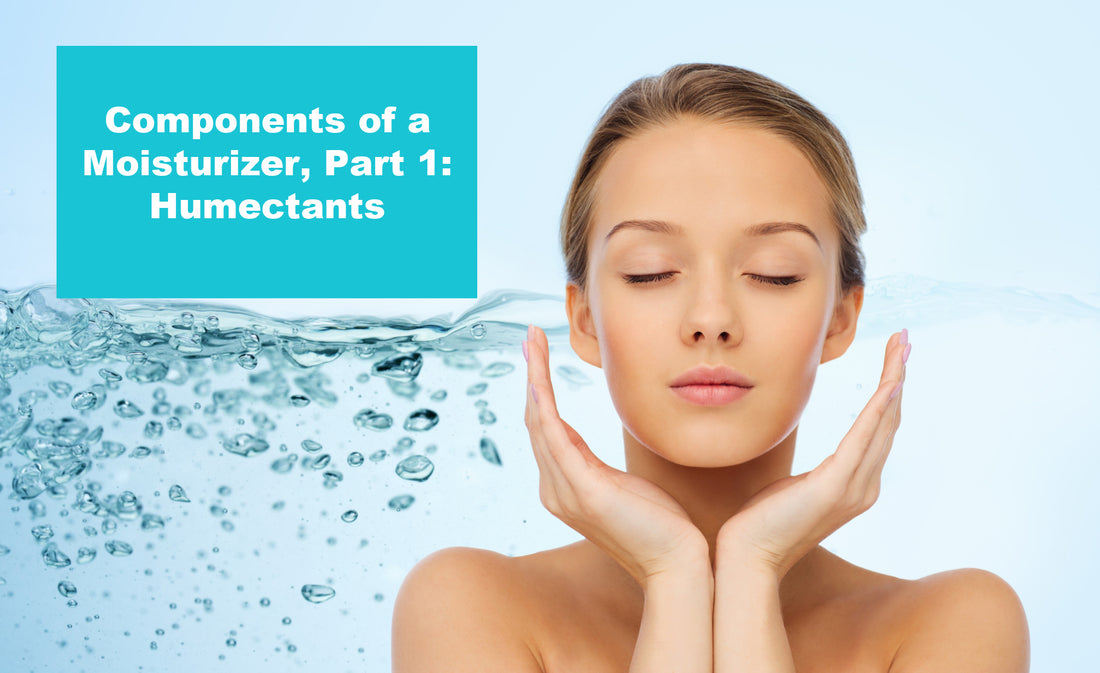
Components of a Moisturizer - Part 1: Humectants
Share
Humectants play a crucial role in skincare by attracting and retaining moisture in the skin. They help to hydrate the skin, improve its moisture balance, and maintain its suppleness. Any moisturizer whether for face or body should contain humectants in order to get the most benefits for skin. Ideally, I like to see a combination of humectants, at minimum 2-3. Here's how humectants work and their benefits in skincare:
Hydration: Humectants have the ability to draw moisture from the environment and bind it to the skin. This helps to replenish and restore moisture levels, keeping the skin hydrated and preventing dryness.
Moisture retention: Humectants create a protective barrier on the skin's surface, reducing water loss through evaporation. By sealing in moisture, they help to maintain hydration for longer periods, leaving the skin soft and plump.
Skin barrier function: Humectants contribute to the integrity of the skin barrier by promoting proper moisture balance. A well-hydrated skin barrier is more resilient and better able to defend against external aggressors, such as pollution and bacteria.
Soothing and calming properties: Certain humectants, like panthenol and glycerin, possess soothing and anti-inflammatory properties. They can help to calm irritation, redness, and sensitivity, making them suitable for sensitive or compromised skin.
Youthful appearance: Well-hydrated skin appears more plump, smooth, and youthful. Humectants such as hyaluronic acid and sodium hyaluronate have a "plumping" effect on the skin, reducing the appearance of fine lines and wrinkles.
Overall, humectants are essential in skincare as they provide hydration, improve moisture retention, support the skin barrier, enhance product efficacy, and contribute to a healthy and youthful complexion. Here are a few common humectants we see in skin care, but this is basically just the tip of the iceberg, not an exhaustive list. In future posts, I will discuss my personal favorite humectants in more detail.
Glycerin: Glycerin is a natural humectant that attracts moisture from the environment, helping to hydrate the skin. It also forms a protective barrier on the skin, preventing moisture loss. It has become a gold standard humectant in formulating skincare.
Hyaluronic Acid: Hyaluronic acid is known for its exceptional ability to retain water. It can hold up to 1000 times its weight in water, making it incredibly hydrating and plumping for the skin.
Sodium PCA: Sodium PCA is a naturally occurring amino acid that is highly effective at binding water to the skin. It helps to improve hydration and keep the skin soft and supple.
Sorbitol: Sorbitol is a sugar alcohol that helps to maintain the skin's moisture levels. It has excellent water-binding properties and is often used in moisturizers and cleansers.
Panthenol: Panthenol, also known as provitamin B5, is a humectant that helps to attract and retain moisture in the skin. It also has soothing and healing properties, making it beneficial for dry or damaged skin.
Sodium Hyaluronate: Sodium hyaluronate is a form of hyaluronic acid that has a smaller molecular size. It can penetrate the skin more easily, providing intense hydration and plumping effects.
Xylitol: Xylitol is a natural humectant derived from plants. It helps to increase the skin's moisture content and has antimicrobial properties, making it suitable for acne-prone or sensitive skin.
